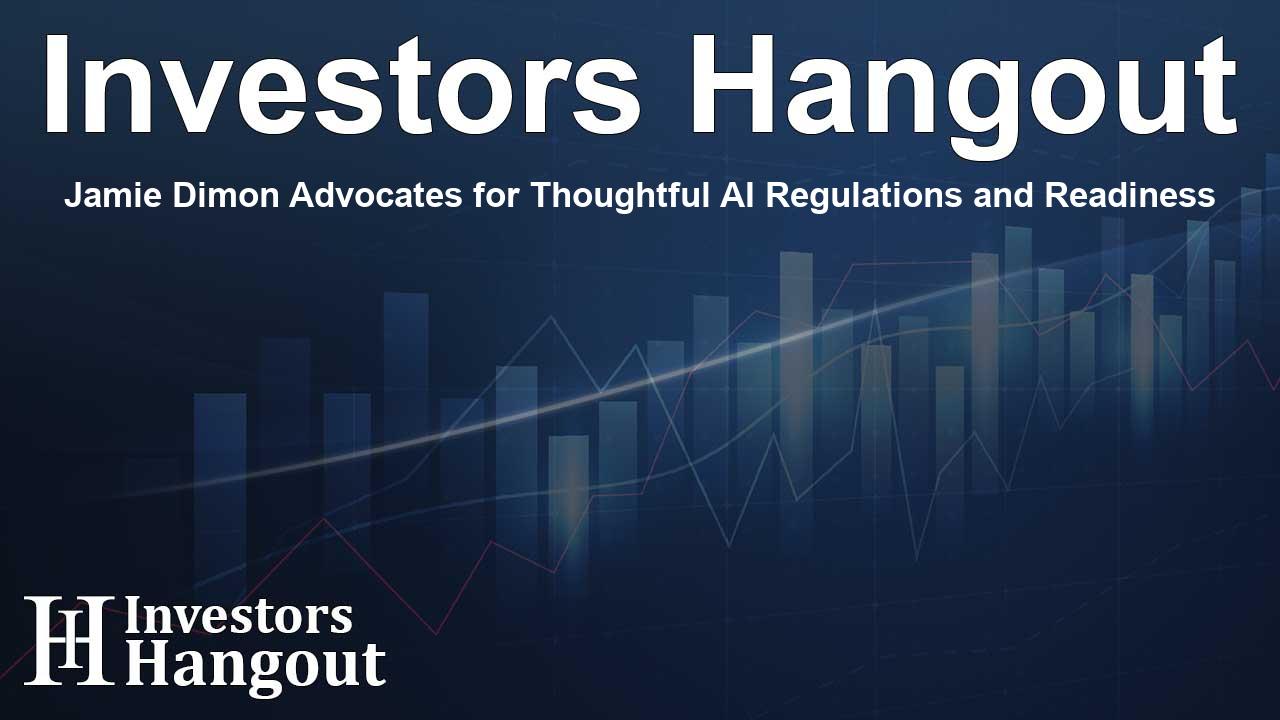Jamie Dimon Advocates for Thoughtful AI Regulations and Readiness

Jamie Dimon's Perspective on AI
Jamie Dimon, the CEO of JPMorgan Chase & Co. (NYSE: JPM), has recently expressed his views on the current state of artificial intelligence (AI) and its potential impact on the economy. He believes the hype surrounding AI is not mere speculation but a vital revolution in technology that could reshape the job landscape.
In a notable interview with a leading business magazine, Dimon emphasized that AI should not be dismissed as just another passing trend. Instead, he stated, it is essential for both governments and industries to prepare for a significant transformation that will inevitably come with the advancement of AI technologies.
The Role of AI in Future Economies
Dimon drew parallels between the present AI discourse and early internet advancements that birthed tech giants like Google and Meta. He cautioned against categorizing AI as a speculative bubble despite ongoing market uncertainties.
The ongoing dialogue around AI comprises a range of opinions. For example, influential hedge fund manager Howard Marks remarked that while current valuations related to AI may seem elevated, they are not irrational or overly optimistic. Conversely, the Chief Economist of the International Monetary Fund (IMF) highlighted concerns about a potential economic bubble, which could echo the infamous dot-com crash.
According to Dimon, it is crucial to recognize that while some elements of the AI industry may be overvalued, the overall framework and direction of AI investment are grounded in real innovation. "You can't look at AI as a bubble, though some of these things may be in the bubble. In total, it'll probably pay off," he asserted.
Anticipating Job Displacement
Dimon has been candid about the potential for AI to disrupt labor markets extensively. In his view, the transition could lead to significant job losses across various sectors. He stated, "People should stop sticking their head in the sand…" urging a proactive approach to managing these changes.
He believes that it is imperative for policymakers to establish comprehensive regulations that safeguard workers and households from the adverse effects of automation and AI deployment in workplaces. Carefully designed regulations are necessary to enhance societal readiness for the impending economic shifts.
Challenges Ahead for Financial Markets
Reflecting on the broader economic landscape, Dimon has voiced concerns about possible downturns in the U.S. stock market. He suggested that the chances of a market correction are higher than what many financial experts anticipate. According to him, failure to address these issues could lead to chaos in economic conditions.
Despite these cautions, JPMorgan reported a surge in profits in its latest quarterly earnings, bouncing back due to strong trading performance and increased investment banking revenues. Notably, even amid a profitable quarter, the bank's shares fell by 1.9% following Dimon's cautious forecasts about the U.S. economy.
Positive Market Momentum
While the immediate outlook seems mixed, industry analysts have noted a positive growth trend for JPMorgan's stock, which has seen significant appreciation year-to-date. The growth metrics suggest a solid momentum in the market, despite the fluctuating sentiment regarding economic stability.
Emphasizing Public Safety Through Regulation
Dimon stressed the urgency for a national conversation about the deployment of AI to prepare both industries and individuals. He advocates for serious discussions around safety mechanisms and regulatory structures that will ensure the public is protected as technological advancements occur.
His proactive stance echoes the sentiments of many thought leaders who believe in responsible innovation. Thoughtful regulations surrounding AI technology will be essential in balancing innovation and economic safety for all stakeholders. As more companies integrate AI into their operations, these discussions will become increasingly pertinent.
Frequently Asked Questions
What are Jamie Dimon's views on artificial intelligence?
Dimon believes AI is a transformative revolution and not just a passing trend, urging preparation for its societal impacts.
How does Dimon relate AI to the early internet?
He compares the current AI hype to the rise of internet giants, advocating for recognition of both its potential and risks.
What precautions does Dimon suggest regarding job losses?
He suggests that governments should implement thoughtful regulations to safeguard the public from job displacement due to AI.
What is Dimon's perspective on current market valuations?
Dimon acknowledges mixed opinions, noting some valuations are high but believes the overall AI investment will pay off.
How has JPMorgan performed financially?
The bank reported increased profits recently; however, its shares experienced a slight decline due to cautious economic forecasts.
About The Author
Contact Lucas Young privately here. Or send an email with ATTN: Lucas Young as the subject to contact@investorshangout.com.
About Investors Hangout
Investors Hangout is a leading online stock forum for financial discussion and learning, offering a wide range of free tools and resources. It draws in traders of all levels, who exchange market knowledge, investigate trading tactics, and keep an eye on industry developments in real time. Featuring financial articles, stock message boards, quotes, charts, company profiles, and live news updates. Through cooperative learning and a wealth of informational resources, it helps users from novices creating their first portfolios to experts honing their techniques. Join Investors Hangout today: https://investorshangout.com/
The content of this article is based on factual, publicly available information and does not represent legal, financial, or investment advice. Investors Hangout does not offer financial advice, and the author is not a licensed financial advisor. Consult a qualified advisor before making any financial or investment decisions based on this article. This article should not be considered advice to purchase, sell, or hold any securities or other investments. If any of the material provided here is inaccurate, please contact us for corrections.
